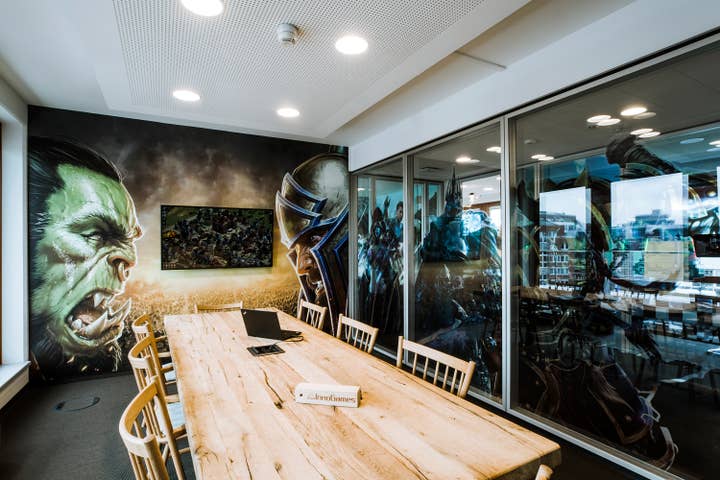Best practices for onboarding new recruits (without actually meeting them)
We talk to Inno Games about how to successfully integrate new members into a remote working team
Onboarding new recruits so they feel welcome is always a crucial process, and one of the many workplace practices that have been completely disrupted by the COVID-19 pandemic.
How do you make someone feel part of a team and convey the tasks they need to do effectively without meeting them? A wealth of indie studios functioning in a remote working capacity knew the answers to that question way before the pandemic struck, but it's an issue many studios had to face for the first time in the past 16 months. And it's one that many more will continue to face as remote working becomes a more common practice.
Since April last year, browser and mobile games developer Inno Games has hired over 60 new employees, and the onboarding process has been 100% virtual for every single one of them.
"You have to spend some more energy and some more time on proactively creating spaces that would be there organically in the office"Jennifer Knaack
"What I have found consistently about this entire remote onboarding thing is that the most important task for anyone who's involved with that is that you have to spend some more energy and some more time on proactively creating spaces that would be there organically in the office," Jennifer Knaack, team lead CRM at Inno Games, tells the GamesIndustry.biz Academy.
"[You don't] have a chance to just pick up some discussion that your colleagues are having at the other table. Who do I talk to? How do I meet new people? Everything just requires a little bit more open space and opportunity, but it's been great."
In this article, we'll delve deeper into how the virtual onboarding process should be handled.

Plan ahead and establish a connection with new employees early
- Make sure you have hardware ready
Virtual onboarding done right has a lot to do with preparation and making sure you plan several aspects of the process way ahead of time.
"We have definitely pushed some of the deadlines that we would usually have forward, and made sure hardware is being ordered a lot earlier," says Justus Graf, software developer at Inno Games. "When you're in the office, it's often easy to just go by office IT, go by the help desk, grab something that's there, and we have moved all these days basically [earlier] in the future."
"Make sure to have everything prepared, because laptop shortage is a thing these days"Jennifer Knaack
From the get go, typically one week after the employment contract with Inno Games is signed, new recruits receive a hardware survey to ask them what they would like to have, Knaack continues.
"Make sure to have everything prepared, because laptop shortage is a thing these days," she says. "And [it's also] just to make sure that we would not have to spend the first days or even the first week sorting out organisational stuff."
It applies to hardware but also to anything that the new employees may need on their first day such as login details or any documentation they might need.
- Establish a connection before they join
Because new recruits might not get the chance to socialise with their new co-workers in the same capacity when working remotely, it's a good idea to try and establish a connection with them before their first day.
"With the last developer that I onboarded in our team, we invited them to meetings or team get-togethers before they actually joined," Graf says. "In an office environment you often have something like you grab a beer on your first afternoon, play some table tennis, but there's a lot less of this natural getting together happening now.
"You didn't have this feeling of awkwardness in the first meetings, because there was already a natural way in how we would communicate with each other"Justus Graf
"So we have been trying to establish a connection between new employees and the team beforehand, getting them to join brainstorming sessions about new features or get them in on quiz nights that we do every now and then, just so that there is already some common ground that you can start off when when they actually join your team. And it's been really good because you didn't have this feeling of awkwardness in the first meetings, because there was already quite a natural way in how we would communicate with each other. People knew the names, they had seen these people before."
Knaack points out that there's typically a "communication vacuum" between the moment the contract is signed and the moment the new recruit joins. But with remote working being the norm, keeping up communication has proven more essential.
"I try to give a bi-weekly update of what's going on in the team just to already slowly incorporate them and, as Justus pointed out, just to avoid this initial awkwardness and this 'all it once' [feeling]," she says. "If you're not being offered the chance to meet the team beforehand, ask for it."
Prepare people for their day-to-day roles, not just the company's culture
A lot of the onboarding process, especially at big companies, focuses on corporate practices and introducing the company and the team to the new recruit. But it's also vital to set expectations about how the work is going to be organised and the nitty gritty of what they'll actually be doing.
The virtual initiation plan at Inno Games -- a studio that employs over 400 people -- has three sections: first is this corporate aspect, then comes a second section focusing mostly on organisational details around the team.
"There the new onboarding person would find all the information about regular meetings for example, because you would not have a situation in the office anymore [where] everybody gets up at the same time and the new person would kind of just walk along," Knaack says.
And then the third section on the initiation plan is tailored to the new position.
"That is also providing some sort of staged process," Knaack continues. "The first two weeks would be very carefully planned and laid out. You will have an intro session about this topic with this person at this point in time, and then slowly fading over into a kind of daily business approach the more you learn.
"The onboarding plan is their most used document in the first weeks or months"Jennifer Knaack
"[It's] providing structure for both sides so I, as a team lead, can be sure that I convey the information that is necessary and that all my expectations are with the person. And also on the other side there is safety and security: 'I'm going to learn about this at this point in time and, if I have any questions, I can ask'. That so far has been a really good practice for us -- the onboarding plan is their most used document in the first weeks or months."
Being remote makes things more challenging for a number of positions, so it's good to have a process in place that is tailored to what the person will be doing and not have a one-fits-all approach.
"For example, if we look at the work of software developers, in office time, it would be quite easy to just put them next to another dev working on the implementation of something," Graf says. "But in a non-office setup, it's just hard to organize. What we do now is we have these tasks that we prepare beforehand and [we] look at the first three to four weeks: which of these tasks that the team is going to work on are good to also give a nice introduction into the kinds of topics we work on?"
Having selected tasks ahead of time, Graf then pairs people up so they can work as a group, get to know each other and learn the process.
Find the right pace
When onboarding new people, whether remotely or in an office, you need to find the right balance between conveying the important ideas and not overwhelming your new recruits with new information. The way Inno Games approaches this is they pair theory and practice: after learning something new, the new recruit is given a task related to it in its day-to-day.
"Mixing up these different types of achievements makes sure that the day-to-day works better"Justus Graf
"So a task that directly ties in with this, so they already have a second point of contact and have an opportunity to bring it in," Knaack explains. "With a little planning ahead -- and I'm not going to lie, this takes some time, but it's definitely worth it in my opinion -- this makes sure that topics really stick. You will find that then there is a natural pacing, because then people are not at risk just of binging all the things and never using them, and forgetting half of it before using them again."
Finding the right pace means also making sure that there are fun tasks in addition to work being done, like playing the game the team is working on.
"We need to be passionate about the game and we need to know the game," Graf says. "We have kind of a natural progression in [Forge of Empires] where we have a tech tree and you advance through the ages. So we'd also say: hey, how about you try to get to know our Bronze Age, try something out, do some battles, and tell us how you like it.
"Mixing up these different types of achievements makes sure that the day-to-day works better, so we would make sure we don't just pair them for six hours working on some code, but say: go play the game, get to know it."

Include a networking aspect
It's important that new recruits also get introduced to the decision makers and stakeholders at the studio, so including this networking aspect to a degree is quite important, Knaack adds.
"Within your own team that is usually manageable, because you would have team meetings, you would have regular occasions for that. But we found that, especially now in a remote setup, we would have to actively plan for people meeting stakeholders or connect the departments, because you don't simply meet them in the hallway or accidentally run into them.
"We would have to actively plan for people meeting stakeholders, because you don't simply meet them in the hallway or accidentally run into them"Jennifer Knaack
"So we took up an approach of actively planning for that. For example, if we have a stakeholder team that has three people and one of them is a total expert, we would take the opportunity to have them meet all three for maybe 15-minute sessions to get the human interaction and the network going, [in addition to] sessions with that one person that can totally talk about all the topics. Because ultimately, looking a few months in the future, it's a key skill to know who to approach for expertise."
Create an introvert-friendly atmosphere
Being introverted and starting at a new studio is never fun, and being remote doesn't make it any easier. Many social activities can be a bit difficult for people who are a bit shy or simply prefer very small group settings, even when done virtually.
Making sure your onboarding process takes this into account is crucial, whether for social activities or other aspects such as meetings.
"One thing that we did just quite recently, because we had actually a couple of more introverted people joining the team, was rethinking how we have discussions during meetings," Graf says. "What you definitely want to avoid is to put people on the spot. You have new people joining and everyone is discussing a topic in a meeting maybe and you're like: 'hey Florian, what do you think?' And maybe they don't think anything and it's just super awkward. You want to avoid this."
Graf advises different structures for holding discussions during meetings: going around the room in a set order, or have everyone prepare their contribution beforehand in text form.

"We can then see which format works best for which people, because everyone prefers different styles of communication in the end," he continues. "This has made our discussions much more fruitful because now that everyone has been challenged to prepare better and accommodate to the same set of new [rules], we don't just sit there and talk, this has made the discussions a lot more efficient."
As part of its initiation plan for the first few days, Inno Games also has 'coffee calls' everyday at 3pm where the team can chat about social activities they want to do, among others. There also are Discord channels where people can hang out all day. This was initially implemented for the new recruits but is now common practice across the company.
"[It's about] creating an environment where it is very easy to join in, so it's not [a case of] I need to approach five people and say: 'hey, can we have a call? I would like to get to know you'. Especially with remote working, it's very hard to get to know people you're not working with a lot."
Knaack adds that organising one-on-one meetings is also a good approach, and makes it easier for more introverted people.
"We also have mentors in place in the first weeks, '' she continues. "[They do] one-on-one meeting for example in the morning to go through what's going on during the day, to take away a lot of the insecurities that make it more challenging like 'I don't know people in the meeting' or 'I don't know what the tone will be', so to have all of this settled beforehand. That helps."
Don't overdo it
When asked about things to avoid during a virtual onboarding process, Graf and Knaack both admit some challenges when it comes to finding the right balance and not overwhelming the new recruits with information.
"For me, one thing that comes to mind is we maybe overdid trying to incorporate new members before they joined," Graf says. "So while it is great that we have a common ground already, sometimes development of a feature can go on for a couple of months, so we'd get them to join meetings beforehand so they could get an understanding of what they were going to get into.

"On one or the other occasion we had a tendency to maybe overdo it, so they were joining a meeting that they a) didn't really understand and b) couldn't contribute to. So I think you need to find a good balance between getting them into meetings that maybe give a high level overview but don't try to get them in some details already. It's likely just going to cause confusion."
Don't drown your new starters in documentation either, or make sure that what they're being given is meaningful rather than being a list of tasks to tick off a list, which is a trap Inno Games fell into with earlier versions of its virtual onboarding process.
"We would offer a whole list of documentation for people to get to know and would say: just make your way through that list," Knaack recalls. "And we would then experience situations where people checked boxes -- they did it, but it was too early, they couldn't find context, it was not yet connected to work. So that was something that we had to step away from.
"We also incorporated a kind of feedback that's usually one of the first presentations somebody is giving in our team -- it's a presentation on how you experienced your first weeks, what you liked, but also what you missed, what scared you, what would you like to know in the future? And we use that to improve.
"And one of the things that comes up repeatedly still is: it's a lot. And of course, there's a lot, but having pacing and making it clear from the beginning: this is week one and you don't have to worry about this topic until week three or four, without creating this fear of missing out as well, that has really helped to improve."
Promote and support open communication
Gathering feedback from your new recruits at the end of the onboarding process is absolutely crucial so it can benefit the following generation of new starters. But successfully onboarding new people goes beyond just feedback.
"One important thing -- and it's a consistent thing with this pandemic and with remote working -- is communication," Knaack says. "It doesn't work without it. For the employer's side: communicate with your new employee, make sure they know what to expect, make sure they feel good and safe. But this also of course applies in the other direction: if there is something missing, if you feel stressed out about something, if something's not working out for you... It is impossible to feel this happening in a remote setup."
She points out that things naturally falling into place is much more difficult to achieve when working remotely. So talking about the challenge being faced is a better approach than hoping for it to be noticed.
"My tip for new people joining: be open -- and maybe a little bit more open than you would normally be in an on-site setup -- about what your needs actually are"Jennifer Knaack
"This would be my tip for new people joining: be open -- and maybe a little bit more open than you would normally be in an on-site setup -- about what your needs actually are. And I hope that every employer provides room and space for people to talk about these kinds of things, but if you don't have that: look for it. Usually there is always an HR department or your supervisor to talk to about these things."
Graf adds that it's inevitable that something will go wrong at some point, but that's not an issue as long as you can speak up.
"We can prepare as much as we want and we will still miss some tiny things, you will feel lost, and I think it's really important that the people joining understand that there is understanding on the other side," he says. "We all have been through onboarding, we all have been new inside teams, and we all grew into our positions of being experts of some sorts over time, we haven't been there on day one. And I think this is something that is very important to remember when you are joining a team: you have been recognized for your records so far. This is something you can always remember: hey, I don't need to be so afraid, I am a good fit, otherwise I wouldn't be here.
"And if you make mistakes, they are needed. We need them to happen so we can improve our processes. So giving feedback early and speaking up is something that is super valuable for both sides."
Concluding our chat, Knaack is keen to remind employers that onboarding new recruits is an invaluable chance to make a positive impact, and it shouldn't be wasted.
"I really am strongly in favour of good onboarding and all the extra work to have this done well remotely does pay off because everybody is a little bit more afraid, a little bit more scared, a little bit more challenged, and if you then provide good experience, then [it's amazing].
"It's a wonderful opportunity to make people not only content or okay with a company, but for the employer, for the team, to make someone positively surprised, to make them feel welcome, to make them excited about work. How often, as an employer, do you get the chance to get new people really excited and to provide a great onboarding that supports them and that connects them and that makes them feel safe? What better chance is there? And all the work that you have to put in, that pays off if you do it right. Everyone wants to have motivated and excellent people and to just limit this capability, this motivation, by not providing the best onboarding possible would be so sad."
